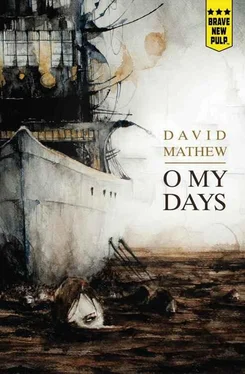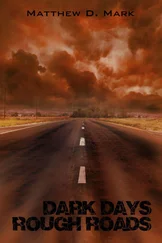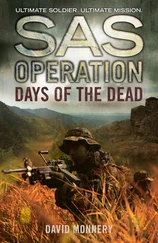David Mathew - O My Days
Здесь есть возможность читать онлайн «David Mathew - O My Days» весь текст электронной книги совершенно бесплатно (целиком полную версию без сокращений). В некоторых случаях можно слушать аудио, скачать через торрент в формате fb2 и присутствует краткое содержание. Город: Oakland, Год выпуска: 2015, ISBN: 2015, Издательство: Montag Press, Жанр: Триллер, Ужасы и Мистика, на английском языке. Описание произведения, (предисловие) а так же отзывы посетителей доступны на портале библиотеки ЛибКат.
- Название:O My Days
- Автор:
- Издательство:Montag Press
- Жанр:
- Год:2015
- Город:Oakland
- ISBN:978-1-940233-22-2
- Рейтинг книги:3 / 5. Голосов: 1
-
Избранное:Добавить в избранное
- Отзывы:
-
Ваша оценка:
- 60
- 1
- 2
- 3
- 4
- 5
O My Days: краткое содержание, описание и аннотация
Предлагаем к чтению аннотацию, описание, краткое содержание или предисловие (зависит от того, что написал сам автор книги «O My Days»). Если вы не нашли необходимую информацию о книге — напишите в комментариях, мы постараемся отыскать её.
“I experienced an acute, often surreal, sense of an offender’s pathology, with all its traps, humour and contradictions.
is a tour de force of powerful writing. It’s demanding, gruelling yet always honest, insightful and finally moving. It explores areas that serious fiction rarely travels to. A quite remarkable novel.”
Alan Price, author of
“This is a writer who has been there, viewed with compassion, and reported back. There is a new mythos here, something that feels ancient and sand-blasted and unfathomable, but it is revealed within the most modern of contexts. Highly recommended.”
Paul Meloy, author of
O My Days — читать онлайн бесплатно полную книгу (весь текст) целиком
Ниже представлен текст книги, разбитый по страницам. Система сохранения места последней прочитанной страницы, позволяет с удобством читать онлайн бесплатно книгу «O My Days», без необходимости каждый раз заново искать на чём Вы остановились. Поставьте закладку, и сможете в любой момент перейти на страницу, на которой закончили чтение.
Интервал:
Закладка:
I am .
But then again, if it wasn’t you I wouldn’t have agreed in the first place. That’s a compliment, by the way.
Thank you.
Oh, and Patrice is fully recovered, thanks for asking.
Not now, Julie. What does he have to say?
Not coming to see us then? she taunts.
Julie, please, I have about two minutes of credit on this fucking thing. The phone just eats it up. If you really want a row, wait till next time, eh?
She waits for a second or two. The second piece of telephone etiquette that Julie religiously observes is this: she will never put the phone down in anger or disgust. Quite correctly, she sees this as a vilely rude thing to do.
Okay, she says. I had to make some notes. How long have you got?
I told you! A couple of minutes!
Keep your hair on, Billy! Fucking hell—I’m doing this for you!
I apologise. Please tell me, Julie, what he said. I can’t speak to him and I would really, really like to know what he said.
He talked about energy. She leaves a huge pause.
Still maintaining the status quo, temper-wise, I urge her to continue.
First of all he congratulated you on a good question. At this point I’m like lost? What’s good about it? But anyway, I don’t really wanna know. So he says: I’m saving my time—and other people’s time—what does that mean?’
Slang, I lie. It’s new code, Julie. Carry on.
Oh Billy, you’re not planning something for when you hit road, are you? she asks with a definite moan of worry running through her words.
Don’t be concerned, I try to reassure her. Nothing illegal.
Then why’s it in code?
Please .
All right, all right, don’t throw your rattle out of the pram, Billy. He’s saving his time and yours and other people’s, like Prometheus did with fire. I won’t ask. Then he laughed—he found the whole bloody thing hilarious, to be honest—he’s quite a happy-go-lucky bloke, really, innee? What’s he in for?
Rape, is what I want to say—the truth. Death by dangerous driving.
Someone die? Julie asks.
Yeah, someone he had beef with. No one innocent. What else does he have to say? Saving time, Prometheus fire, what else?
He’s had it with stealing water. Whatever that means. So he’s going to steal as much time as he can, till he’s full like a tick full of blood. He’s going to—wait a minute, let me turn over the paper—he’s going to save it then kill it. Does that make any sense to you, Billy?
Not much, I admit.
I kept asking him if you’d know what he was talking about but he just smiled, says Julie. Said—he couldn’t keep going on the way he was, smaller and smaller—whatever that means—because it’s a circle he starts again.
Didn’t think of that.
Think of what?
Why he might be frightened of getting younger as we see it, older as he sees it, Julie. Because it doesn’t stop for him, you see? A million years of bee-stings. Prometheus on the rock. Eternal punishment, Julie! That’s why he wants to go back to being young. Well, old; but young for him. Well, he’s still old—but his years on the planet are less, at that end.
Billy, what end?
I’m right—what I say to Kate. If he does enough damage, he’ll get older and older to the point where there must be a start! The only way to kill himself, Julie, is if he takes himself past the point where he started!
You’re not making any sense!
It’s not Julie putting the phone down that kills the call. I’ve run out of credit. But it doesn’t really matter as I think I know what needs to be done.
Four.
The Murder of Roger Ackroyd bears on its inside back cover no adhesive ticket on which to stamp a return date, but it has been sheathed in protective plastic: Kate’s own work, I reckon. This is a book she’s brought into the jail. This is a message to me, but nothing subtextual. I mean, I happen to know that the narrator done it—whodunit? The narrator done it—and if there is anything to go on by her choice of book, it’s beyond me. We all know I done it. Although I pleaded not guilty in court, I know damn well I stabbed the very man who has since got my Julie pregnant. And grudgingly I sigh through it, this televised memory, thinking with candour two things, namely one: why do I always remember being attacked by three men on that night, and two: well, if you can’t call that a good example of tit for tat then what can you? Billy Cardman banging up my bird, I mean; not the three guys setting on me, although for all I can recall, so coked-up was I in those days, this might be true as well. As I’ve said, I don’t know where the memory comes from.
There is a letter inside the book. The paper is as thin as toilet tissue—presumably so it’s easier to conceal. It is headed: The Heartbreak Diaries . Then it is written: Chapter 1: Nightmare Music . I get it. If the thing is discovered, it’s more creative writing from my sister. She is writing her first novel, I’ll say. So be it:
Noor showed early talents for pain—for inflicting pain. They were few and far between—and usually against animals. Given the ability to walk, he walked into conflict. Given the mindset that encompassed choice, he chose to hurt. He would stub out cigarettes on the hides of oxen. Punch camels in the face. Throw stones at the feral cats and dogs. And only slowly, over a period of years and years, would he graduate upwards—to human beings. Very often the damage was limited, paltry—and very often as the result of imbibed fermented products. Fights in the bars were commonplace, occasionally legendary. He had a knack for goading people, for egging them on. He started fights, sometimes, in which he didn’t even take part. He was happy to watch. Why wasn’t he exiled from Umma? This was something I was desperate to learn; but the answer—if there is one—had been long since lost in the dust by the time I came to ask questions. Possibly? Possibly because he recanted his earlier ways. After a while—a long while—a period of decades—Noor was calm. Like a prizefighter settling into retirement. He got along well, the word goes, with the citizens of Hospital; but if he’d stayed that way of course there would be no story for him. No clothes to wear. And figuratively speaking, during that time, he had no clothes to wear. He was poor. Days and weeks he spent, like many others, trying to scratch a living by working for a filling meal. There wasn’t enough work. Noor started stealing. Years earlier, when Noor was older, he had gained daily sustenance from a wetnurse named Saira el Door. The image might seem disgusting, even frightening, but this old man as we would see him was no more capable of his own self- managed salvation than a baby would be, and the Wethouse was how the word hospital translated. Noor would crawl in for his wassail at this old matron’s saintly dugs. She gave suckle to the infantile and the senile alike, given the circumstances. With Noor she even waived direct payment for her services. She and Noor had become friends. It was frequent that Noor would spend hours in her company, at the Wethouse and in her shack. She fed him, legitimate food by this point, or he fed her, depending on whether or not he’d been able to thieve any vegetables, or a chicken, or had been able to sell his muscle in return for a few handfuls of rice. It was common knowledge that Saira was a wisewoman of the township. And it was believed it was Saira who put the idea of a pilgrimage back into the desert into Noor’s head. The claim was that in the sands, far away but no one knew in which direction, there were other, smaller oases. There were kings that could be grown from the parched earth. All they needed for cultivation was special water and faith. Saira could provide the water—she could bless a carrying skin of water—if Noor had faith enough to venture to the sun, endure the bitter nightfalls, and return with a king on his side. Who knows? Perhaps it was all fallacy. It’s occurred to me that this might have been a convenient way for Saira to be rid of the albatross around her neck that Noor had become. But that is not how the townspeople told it. If desperation has an eye—a central point of calm—it might be constructed in the shape of a town surrounding a vast body of water that has no right to exist in the wilds of a desert. It might look instead like a prison. Go outside of that eye and what might one find? Maybe hope? Maybe joy. Something positive—who knows?—on the face of the desert. It was a common belief. Such pilgrimages were commonplace. No one—it seemed—was precisely sure of what the concept of growing a king actually meant, but I took it to refer metaphorically to an act of faith and devotion. Finding God. Finding the Devil. Finding oneself, perhaps. Bringing good fortune back to the tribe, and the knack of bringing food to the table and water to the cup. But it was a boy called Morjardahid who was finally Noor’s spur to go off in search of a king. The boy—it was said—was beatific in appearance; angelic, almost. A dark-hued seraphim from the scalp and then the brow of the desert’s face, as seen from above. It was a cobbler called Siam who told me the tale. Siam was mending espadrilles but was happy to talk to this strange Western woman with her inquisitve nose for a good myth or yarn. Morjardahid arrived in Mostashifa in a condition of great excitement. Even his own parents had disregarded any hope of seeing their runaway son alive again. But not only was the boy alive, he had been energised by his travels. ‘The hair is grass!’ he repeated, over and over. When I asked what the boy might have meant, Siam told me of how a desert, viewed down-upon from above, was the shape and had the features of a face. Dunes for cheekbones; the troughs between for dents at the temples, for lines on a forehead. Plump rows of sand-hillocks delineating the lips of the Allbeing. And when the wind moved the sand, the face changed. The Allbeing was eating, his lips and jaw moving, when a storm kicked the sand about into different and swiftly changing regular patterns. The Allbeing was angry; the Allbeing was sad. When the Allbeing was contented, the temperature dropped. It was night. I asked Siam: ‘If the desert is a higher being’s face, what part of that façade is Mostashifa?’ He stopped his shoe repairs. ‘A birth mark,’ he replied. Morjardahid had discovered grass. God’s hair was grass. It would have been far from prudent to inquire after the hairstyle, so I waited for Siam to continue. The story still baffled him—and even puffed him out. As he told what he intended to finish, he was breathing as though he’d run from the desert himself—a surrogate to the child, experiencing the same sense of revelation. Morjardahid was one of Saira’s errand boys; but she was also his teacher. She taught him scripture, morals, and Spanish, bizarrely enough. Comparatively wealthy by local standards as she was, and unbeknownst to anyone in the township (although tongues wagged and rumours abounded), Saira had paid the boy’s impoverished parents for the right to send Morjardahid on his expedition to find sources of food and water. He’d come back with a boast about grass! How he showed it off in the Wethouse, proud and seemingly still amazed: a tuft of grass. A muted interest, and no more than that, was abroad—apart from in the mind of Noor. It was Noor who consulted with Saira on the theoretical subject of where there is grass there might be soil for cultivation. Of course the logic was flawed. Did they not live beside a vast watering hole where there shouldn’t be one? But all the same, sensing change and possibility, Noor took hold of his fear for the future—his terror of growing younger—and enlisted Morjardahid’s assistance in returning to the other form of distant oasis, more or less before the boy’s boots had cooled. He told Saira that he wanted to find the green grass, to grow a king; and he wanted the king to stop him travelling backwards. When Saira refused, however, to bless the water he’d need to carry, Noor committed the unthinkable, and desecrating their bond and friendship, stole water in sheepskins from the Wethouse, along with as much money as he could find after breaking into the building one evening and knocking Saira unconscious, underpaid the boy’s parents, and set off into the wilds with the child. What happened, months and months into the wayfair, was even more speculative than what has been written up to this point. How could it not be? With the stories of Noor’s life in Umma, there were at least witnesses—witnesses being storytellers, co-defendants, accessories—or the offspring of witnesses, however corrupted and curdled the tales might have become. Do echoes ever really die down to nothing at all? Perhaps the township is still talking about the old man who became a younger man, who rode into the lap of a heartless son, with a boy at his side. But how did they live? What food did they take? What water, other than that sterilised in processes that are vital to the welfare of a shanty medical centre, did they sip as they plodded and gasped through the sand? As they crested one dune after another, what did they discuss? What demons assailed them as they prayed for a god? Four months after they’d left, the boy arrived back in Umma for the second time. He was alone. He was also in a state of high fever and prone to a virulent strain of epilepsy from which he had never suffered before. He kept talking about sad roses. The answer to any question, for the first few days after he lay down his head in his parents’ home, was ‘sad roses’. In accordance with one belief that anything the human body sheds can be recycled, his mother wrung the sweat from his sheets and pillowcase and distilled the salt from it to feed it back to her son’s parched lips. His father butchered one of his valued and valuable hens, to make broth. Together they nursed the child back to something resembling good health. Physical health, anyway: it was feared that Morjardahid’s mind was gone—fried to nothing. A robot drew a beam along his legs and torso, diagnosing anything erroneous in the boy’s human make-up. The printout suggested that limbs and organs were in working order. However, when the brain was scanned the robot could find nothing to print out. There was no diagnosis, and it was feared there was nothing left working inside the skull. ‘What happened to the old man?’ he was asked. ‘He’s still there.’ ‘What’s he doing?’ ‘Growing roses.’ ‘Roses?’ ‘Roses. They are knitting together to grow a king.’ After a further two weeks, during which Morjardahid changed his story by not one jot, but when in every other sense he seemed to be of generally good mental health, it was assumed that Noor had put some kind of spell on him. Assumed he’d managed to condition him into his beliefs. Nearly a year had passed since his departure—when Noor returned to the Oasis. More sprightly than he had been when he left, he hobbled into a town larger than the one of a year before—more bustling, more chaotic, irrefutably louder—fully expecting the flags and trumpets of a hero’s welcome. What self-delusion, the passage of time, and sheer hubris had erased from his memory, however, was the fact that not only had he violently attacked Saira el Door, which might have been forgiven, seeing that she had passed away in the intervening span, a victim of brain contusion and heartbreak, but he had also stolen water from the Wethouse, the crime of water theft being regarded as heinous. So, no celebrations; quite the reverse. As soon as he’d been identified and tracked down—he was frequenting the same bar he had patronised for several years—he was stunned with an electric cattle prod, stripped of what remained of his clothing, and shackled in a set of wooden stocks by the water, there to be tried by a hangman jury the following morning, if the chickenhawks failed to peck the skin from his bones and the liver from his torso in the meantime. His neck was saved. Despite his protestations that he might well have saved the township with his derring-do, Noor was sentenced to an indeterminate tariff on board the prison ship. All the while he was dressing in his off-white prison fatigues, he continued to say the king could help them all. The computerised rowboat was programmed and waiting. But things get hazy after this. That Noor was dragged on board the prison ship is not in doubt; nor is the reality that he toiled and struggled thereon. What I find intriguing, though, is what he is said to have screamed from the rowboat as it was taking him away—and screamed till his lungs must have itched: ‘My king told me he would find me, or I must find him!’ And: ‘My king told me he’d be everywhere!’
Читать дальшеИнтервал:
Закладка:
Похожие книги на «O My Days»
Представляем Вашему вниманию похожие книги на «O My Days» списком для выбора. Мы отобрали схожую по названию и смыслу литературу в надежде предоставить читателям больше вариантов отыскать новые, интересные, ещё непрочитанные произведения.
Обсуждение, отзывы о книге «O My Days» и просто собственные мнения читателей. Оставьте ваши комментарии, напишите, что Вы думаете о произведении, его смысле или главных героях. Укажите что конкретно понравилось, а что нет, и почему Вы так считаете.












